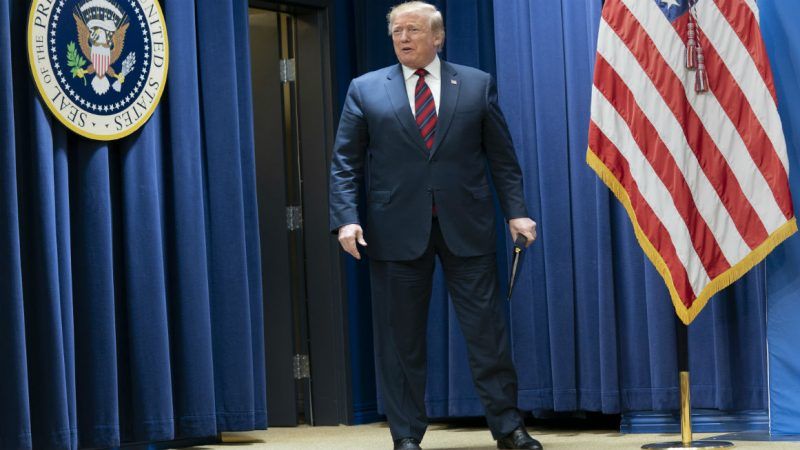Donald Trump, Scaredy-Cat
Why is the president rigging a primary fight he's leading by 70 percentage points?

"Crooked Hillary," Donald Trump tweeted in November 2017, "bought the DNC & then stole the Democratic Primary from Crazy Bernie!" The unusually tight relationship during the 2016 primary between the Democratic National Committee and its presidential front-runner, the president suggested, might be worthy of a Justice Department investigation.
If that were true, then the FBI should have a new case on its hands: the unprecedented collusion between the Republican National Committee and Trump himself.
Clinton, in August 2015, signed a secretive and controversial joint fundraising agreement with the DNC that gave her the vast bulk of money raised and eventually placed some of the party machinery under her financial control. Trump, on the other hand, hasn't just influenced and benefited from the RNC; he's inhaled it like a cheeseburger.
In December, nearly two years before the 2020 election, the Republican Party and the president's re-election campaign literally merged into a single unit, called Trump Victory, which RNC Chair Ronna McDaniel clucked would be "the biggest, most efficient and unified campaign operation in American history." In January, the party passed a resolution giving the president its "undivided support."
Political party apparatuses are supposed to be impartial arbiters of primary contests, not corner men for the reigning champions. Yet McDaniel at the Conservative Political Action Conference in February boasted that any Republican foolish enough to challenge Trump in the 2020 primaries would "lose horribly," adding this taunt to the Bill Welds of the world: "So have at it, go ahead, waste your money, waste your time and go ahead and lose."
Weld, who officially launched his campaign Monday, called McDaniel's comments at the time "a stunning reversal of past party practice of honoring neutrality in primaries," asking: "What is it they are so afraid of?"
That may be the most puzzling question of all. Trump is clobbering Weld in the polls—85% to 15%, according to a national Emerson survey released this week. Even in Weld's home state of Massachusetts, where he was a popular two-term governor in the 1990s, the president has a gargantuan 82-18 lead.
Approval of Trump among Republicans has stabilized at around 90%, according to Gallup polling, and Robert S. Mueller III's special investigation—which would-be candidates John Kasich and Maryland Gov. Larry Hogan had been waiting for to help inform their decisions on whether to run—has failed thus far to land a serious blow. Sure, Republican voters may say they want more competition, but when presented with actual names, they tend to jump back into the arms of the party's standard-bearer.
And yet the Trump machine is taking a bazooka to this thumb-wrestling match, inserting Trumpist yes men in regional party leadership positions—including in the crucial early states of Iowa, New Hampshire and South Carolina. Some of those apparatchiks have wondered out loud whether the party even should hold primaries next year.
"I've never seen anything like it and I've been involved in the Republican Party for most of my life," Hogan told Politico in February. "It's unprecedented."
Such a cartoonish show of force is clearly designed to scare off potential competitors before they even get in the ring. But like many exaggerated projections of strength, it's giving off the unseemly whiff of flop sweat.
There is a parallel here. Once upon a time, a Republican incumbent president popular within his own party faced minor competition both in early-state GOP primaries and among a rowdy Democratic field. There was some scandal and gross arm-twisting emanating from the White House, though not yet in a seriously prosecutable way; meanwhile the left was flirting more openly with socialism than it had in a generation.
In the end, Richard Nixon would squash the antiwar Californian Pete McCloskey like a bug in New Hampshire, before romping to the kind of general-election landslide that Donald Trump can only dream about. But along the way the president's paranoia, crude habits and questionable taste in personnel—Roger Stone, anyone?—sowed the seeds of his administration's destruction.
It is a time-wasting folly for Democrats to expect some mythical Watergate 2.0 to solve their biggest political problem with a single bang of the gavel. If anything, the analogy is more teachable for Trump himself. It's the smallest men who require the biggest parades, and the organizations they corrupt will be staffed by compromised opportunists.
The president should welcome a political fight—he's certainly better at it right now than any national Republican. But by stacking the deck so grossly in his favor, Trump is making the tacit admission that he just doesn't believe in himself. Be very afraid when the president is scared.


Show Comments (57)